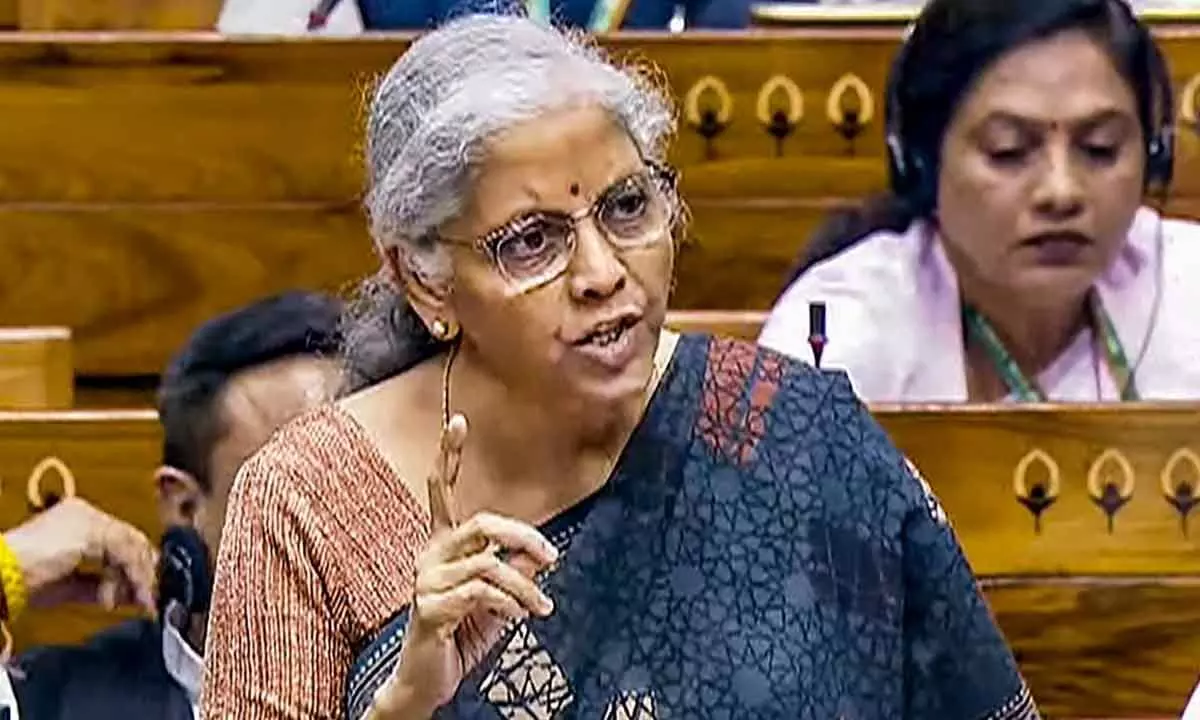Live
- 3rd Test: Day one’s play at the Gabba called off due to persistent rain
- National Energy Conservation Day: Switch to Energy-Efficient Devices
- Rekha gets emotional as she shares a heartfelt moment with Big B's grandson Agastya Nanda
- Senior Cong leader EVKS Elangovan passes away in Chennai
- CID's Counter Intelligence raids multiple places in J&K’s Anantnag, Kulgam districts
- India's growth on resilient trajectory, equity markets in consolidation phase
- KJo on 23 years of ‘Kabhi Khushi Kabhie Gham’: One of those pinch me moments
- WPL 2025 auction: Nandini, Kamalini set to be most sought-after names
- MP CM to inaugurate Sarsi resort in Shahdol, 200-bed hospital in Mauganj today
- TGPSC makes arrangements for Group-2 exams to be held tomorrow
Just In

Eco Survey pegs India GDP growth at 7%
The Economic Survey highlights the prevailing strengths of our economy and also showcases the outcomes of the various reforms our government has brought. It also identifies areas for further growth and progress as we move towards building a Viksit Bharat'- Modi
New Delhi: The Central government's pre-Budget Economic Survey on Monday set a conservative growth forecast of 6.5 to 7 per cent for the current fiscal as it
flagged the need for creating more jobs in the economy and backed more Chinese direct investments to boost exports.
The report, which is authored by the Chief Economic Adviser's office, favoured considering targeting inflation that excludes food, the prices of which are influenced more by supply than demand.
It sounded a bell of caution on the soaring stock markets, saying retail investor participation has increased significantly and there are chances of speculations due to overconfidence and expectations of greater returns.
The Survey, tabled by Finance Minister Nirmala Sitharaman in Parliament, projected a 6.5 per cent to 7 per cent GDP growth rate in the current fiscal year that started in April. This is lower than the 8.2 per cent growth seen in the previous 2023-24 (April 2023 to March 2024) fiscal and below RBI's 7.2 per cent estimate for the current fiscal.
Commenting on the survey, Prime Minister Narendra Modi said, "The Economic Survey highlights the prevailing strengths of our economy and also showcases the outcomes of the various reforms our Government has brought. It also identifies areas for further growth and progress as we move towards building a Viksit Bharat".
"The Indian economy is on a strong wicket and stable footing, demonstrating resilience in the face of geopolitical challenges," Chief Economic Adviser V Anantha Nageswaran wrote in the preface to the annual report card on the state of the economy.
He, however, hastened to add that fears of cheaper imports from countries with excess capacity could limit the formation of private capital. Acknowledging that this year's forecast was on the conservative side, and lower than market expectations, the Survey cited slower investment growth by the private sector as well as uncertain weather patterns as some of the reasons for caution.
For the medium-term, it saw a potential of 7 per cent-plus growth rate on a sustained basis if structural reforms are implemented.
The report, which came just a day before Sitharaman presents the Budget for 2024-25 that is likely to lay out the economic priorities of the Modi 3.0 government and the vision for a developed nation by 2047, identified boosting private investment, strengthening small businesses and agriculture, raising financial resources for climate change adaptation, easing red tape for small businesses, and tacking income inequality as focus areas.
Priorities should also include bridging the gap between education and employment, it said, calling for expediting implementation of labour reforms to create a more conducive environment for job creation. “The Indian economy needs to generate an average of nearly 7.85 million jobs annually until 2030 in the non-farm sector to cater to the rising workforce,” the report said.
In the preface to the Survey, the CEA said job creation happens mainly in the private sector. “Second, many (not all) of the issues that influence economic growth, job creation and productivity and the actions to be taken therein are in the domain of state governments.”
“So, in other words, India needs a tripartite compact, more than ever before, to deliver on the higher and rising aspirations of Indians and complete the journey to Viksit Bharat by 2047,” he said.
He termed Prime Minister Narendra Modi coming to power for a third time as an “unprecedented third popular mandate” that “signals political and policy continuity” and in the same breath stated that “letting go is part of good governance”.
“The Indian state can free up its capacity and enhance its capability to focus on areas where it has to by letting go of its grip in areas where it does not have to,” he said. “The Licensing, Inspection and Compliance requirements that all levels of the government continue to impose on businesses is an onerous burden. Relative to history, the burden has lightened. Relative to where it ought to be, it is still a lot heavier.”
The Survey called for boosting direct investment from China while reducing imports from that country.
Amid strained ties since 2020 after border skirmishes, the report said to boost exports, India can either integrate into China’s supply chain or promote foreign direct investment from China.
“Among these choices, focusing on FDI from China seems more promising for boosting India’s exports to the US, similar to how East Asian economies did in the past,” it said, adding choosing the FDI strategy “appears more advantageous than relying on trade” as it can arrest the growing trade deficit India has with China.

© 2024 Hyderabad Media House Limited/The Hans India. All rights reserved. Powered by hocalwire.com







